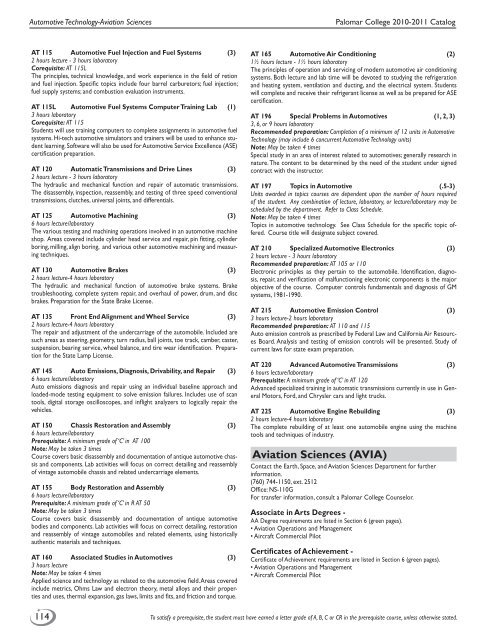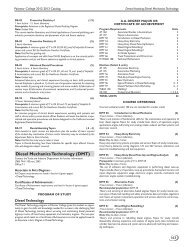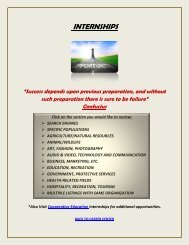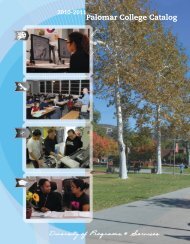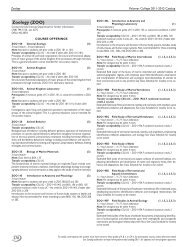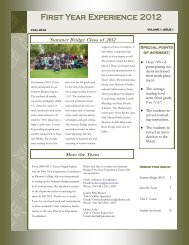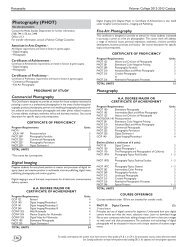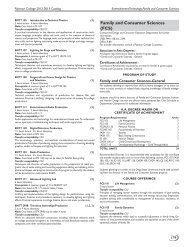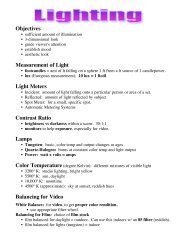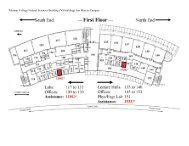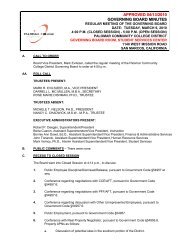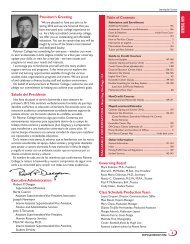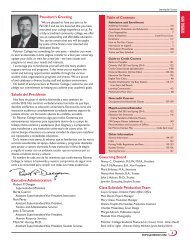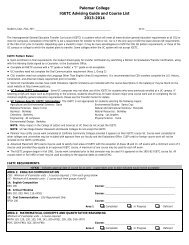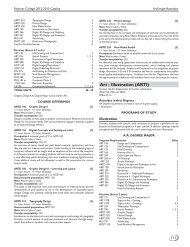Download the complete catalog - Palomar College
Download the complete catalog - Palomar College
Download the complete catalog - Palomar College
Create successful ePaper yourself
Turn your PDF publications into a flip-book with our unique Google optimized e-Paper software.
Automotive Technology-Aviation Sciences<br />
<strong>Palomar</strong> <strong>College</strong> 2010-2011 Catalog<br />
AT 115 Automotive Fuel Injection and Fuel Systems (3)<br />
2 hours lecture - 3 hours laboratory<br />
Corequisite: AT 115L<br />
The principles, technical knowledge, and work experience in <strong>the</strong> field of retion<br />
and fuel injection. Specific topics include four barrel carburetors; fuel injection;<br />
fuel supply systems; and combustion evaluation instruments.<br />
AT 115L Automotive Fuel Systems Computer Training Lab (1)<br />
3 hours laboratory<br />
Corequisite: AT 115<br />
Students will use training computers to <strong>complete</strong> assignments in automotive fuel<br />
systems. Hi-tech automotive simulators and trainers will be used to enhance student<br />
learning. Software will also be used for Automotive Service Excellence (ASE)<br />
certification preparation.<br />
AT 120 Automatic Transmissions and Drive Lines (3)<br />
2 hours lecture - 3 hours laboratory<br />
The hydraulic and mechanical function and repair of automatic transmissions.<br />
The disassembly, inspection, reassembly, and testing of three speed conventional<br />
transmissions, clutches, universal joints, and differentials.<br />
AT 125 Automotive Machining (3)<br />
6 hours lecture/laboratory<br />
The various testing and machining operations involved in an automotive machine<br />
shop. Areas covered include cylinder head service and repair, pin fitting, cylinder<br />
boring, milling, align boring, and various o<strong>the</strong>r automotive machining and measuring<br />
techniques.<br />
AT 130 Automotive Brakes (3)<br />
2 hours lecture-4 hours laboratory<br />
The hydraulic and mechanical function of automotive brake systems. Brake<br />
troubleshooting, <strong>complete</strong> system repair, and overhaul of power, drum, and disc<br />
brakes. Preparation for <strong>the</strong> State Brake License.<br />
AT 135 Front End Alignment and Wheel Service (3)<br />
2 hours lecture-4 hours laboratory<br />
The repair and adjustment of <strong>the</strong> undercarriage of <strong>the</strong> automobile. Included are<br />
such areas as steering, geometry, turn radius, ball joints, toe track, camber, caster,<br />
suspension, bearing service, wheel balance, and tire wear identification. Preparation<br />
for <strong>the</strong> State Lamp License.<br />
AT 145 Auto Emissions, Diagnosis, Drivability, and Repair (3)<br />
6 hours lecture/laboratory<br />
Auto emissions diagnosis and repair using an individual baseline approach and<br />
loaded-mode testing equipment to solve emission failures. Includes use of scan<br />
tools, digital storage oscilloscopes, and inflight analyzers to logically repair <strong>the</strong><br />
vehicles.<br />
AT 150 Chassis Restoration and Assembly (3)<br />
6 hours lecture/laboratory<br />
Prerequisite: A minimum grade of ‘C’ in AT 100<br />
Note: May be taken 3 times<br />
Course covers basic disassembly and documentation of antique automotive chassis<br />
and components. Lab activities will focus on correct detailing and reassembly<br />
of vintage automobile chassis and related undercarriage elements.<br />
AT 155 Body Restoration and Assembly (3)<br />
6 hours lecture/laboratory<br />
Prerequisite: A minimum grade of ‘C’ in R AT 50<br />
Note: May be taken 3 times<br />
Course covers basic disassembly and documentation of antique automotive<br />
bodies and components. Lab activities will focus on correct detailing, restoration<br />
and reassembly of vintage automobiles and related elements, using historically<br />
au<strong>the</strong>ntic materials and techniques.<br />
AT 160 Associated Studies in Automotives (3)<br />
3 hours lecture<br />
Note: May be taken 4 times<br />
Applied science and technology as related to <strong>the</strong> automotive field. Areas covered<br />
include metrics, Ohms Law and electron <strong>the</strong>ory, metal alloys and <strong>the</strong>ir properties<br />
and uses, <strong>the</strong>rmal expansion, gas laws, limits and fits, and friction and torque.<br />
AT 165 Automotive Air Conditioning (2)<br />
1½ hours lecture - 1½ hours laboratory<br />
The principles of operation and servicing of modern automotive air conditioning<br />
systems. Both lecture and lab time will be devoted to studying <strong>the</strong> refrigeration<br />
and heating system, ventilation and ducting, and <strong>the</strong> electrical system. Students<br />
will <strong>complete</strong> and receive <strong>the</strong>ir refrigerant license as well as be prepared for ASE<br />
certification.<br />
AT 196 Special Problems in Automotives (1, 2, 3)<br />
3, 6, or 9 hours laboratory<br />
Recommended preparation: Completion of a minimum of 12 units in Automotive<br />
Technology (may include 6 concurrent Automotive Technology units)<br />
Note: May be taken 4 times<br />
Special study in an area of interest related to automotives; generally research in<br />
nature. The content to be determined by <strong>the</strong> need of <strong>the</strong> student under signed<br />
contract with <strong>the</strong> instructor.<br />
AT 197 Topics in Automotive (.5-3)<br />
Units awarded in topics courses are dependent upon <strong>the</strong> number of hours required<br />
of <strong>the</strong> student. Any combination of lecture, laboratory, or lecture/laboratory may be<br />
scheduled by <strong>the</strong> department. Refer to Class Schedule.<br />
Note: May be taken 4 times<br />
Topics in automotive technology. See Class Schedule for <strong>the</strong> specific topic offered.<br />
Course title will designate subject covered.<br />
AT 210 Specialized Automotive Electronics (3)<br />
2 hours lecture - 3 hours laboratory<br />
Recommended preparation: AT 105 or 110<br />
Electronic principles as <strong>the</strong>y pertain to <strong>the</strong> automobile. Identification, diagnosis,<br />
repair, and verification of malfunctioning electronic components is <strong>the</strong> major<br />
objective of <strong>the</strong> course. Computer controls fundamentals and diagnosis of GM<br />
systems, 1981-1990.<br />
AT 215 Automotive Emission Control (3)<br />
3 hours lecture-2 hours laboratory<br />
Recommended preparation: AT 110 and 115<br />
Auto emission controls as prescribed by Federal Law and California Air Resources<br />
Board. Analysis and testing of emission controls will be presented. Study of<br />
current laws for state exam preparation.<br />
AT 220 Advanced Automotive Transmissions (3)<br />
6 hours lecture/laboratory<br />
Prerequisite: A minimum grade of ‘C’ in AT 120<br />
Advanced specialized training in automatic transmissions currently in use in General<br />
Motors, Ford, and Chrysler cars and light trucks.<br />
AT 225 Automotive Engine Rebuilding (3)<br />
2 hours lecture-4 hours laboratory<br />
The <strong>complete</strong> rebuilding of at least one automobile engine using <strong>the</strong> machine<br />
tools and techniques of industry.<br />
Aviation Sciences (AVIA)<br />
Contact <strong>the</strong> Earth, Space, and Aviation Sciences Department for fur<strong>the</strong>r<br />
information.<br />
(760) 744-1150, ext. 2512<br />
Office: NS-110G<br />
For transfer information, consult a <strong>Palomar</strong> <strong>College</strong> Counselor.<br />
Associate in Arts Degrees -<br />
AA Degree requirements are listed in Section 6 (green pages).<br />
• Aviation Operations and Management<br />
• Aircraft Commercial Pilot<br />
Certificates of Achievement -<br />
Certificate of Achievement requirements are listed in Section 6 (green pages).<br />
• Aviation Operations and Management<br />
• Aircraft Commercial Pilot<br />
114 To satisfy a prerequisite, <strong>the</strong> student must have earned a letter grade of A, B, C or CR in <strong>the</strong> prerequisite course, unless o<strong>the</strong>rwise stated.


